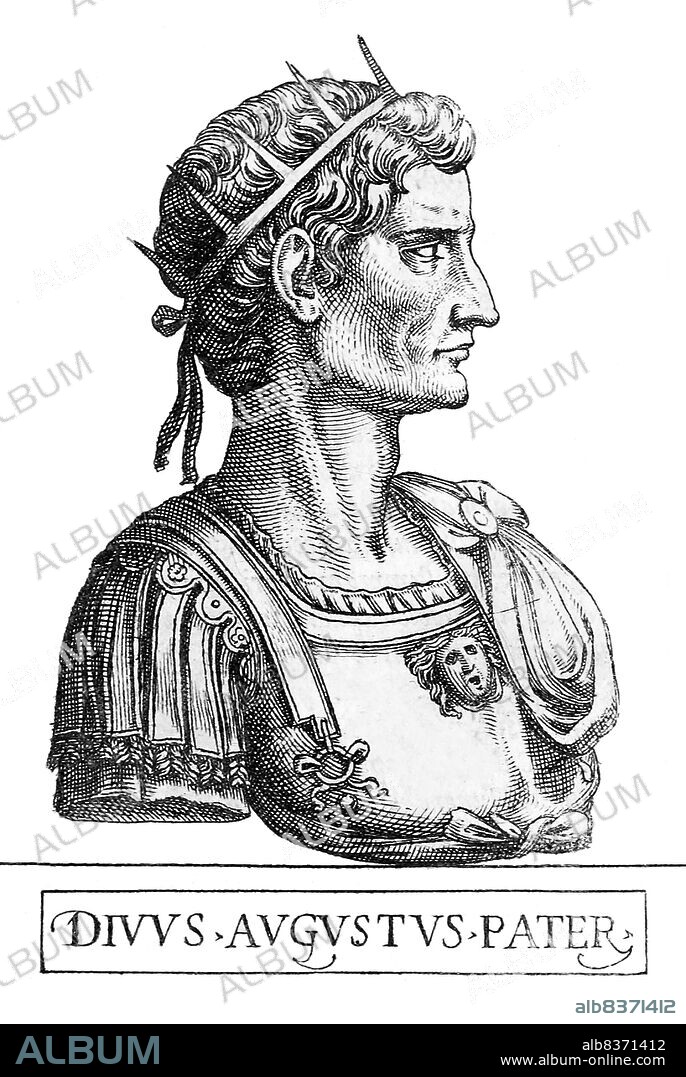alb8371412
Italy: Augustus Caesar (63 BCE-14 CE),1st Roman Emperor, from the book Romanorvm imperatorvm effigies: elogijs ex diuersis scriptoribus per Thomam Treteru S. Mariae Transtyberim canonicum collectis< / i>,1583

|
Zu einem anderen Lightbox hinzufügen |
|
Zu einem anderen Lightbox hinzufügen |



Haben Sie bereits ein Konto? Anmelden
Sie haben kein Konto? Registrieren
Dieses Bild kaufen.
Nutzung auswählen:

Titel:
Italy: Augustus Caesar (63 BCE-14 CE),1st Roman Emperor, from the book Romanorvm imperatorvm effigies: elogijs ex diuersis scriptoribus per Thomam Treteru S. Mariae Transtyberim canonicum collectis< / i>,1583
Untertitel:
Siehe automatische Übersetzung
Born Gaius Octavius, his maternal great-uncle Julius Caesar was assassinated in 44 BCE, and Octavius, now calling himself Octavian, was named in Caesar's will as his adopted son and heir. He, Mark Antony, and Marcus Lepidus formed the Second Triumvirate to defeat the assassins of Caesar. Following their victory at Philippi, the Triumvirate divided the Roman Republic among themselves and ruled as military dictators. Competing ambitions eventually tore the Triumvirate apart and engulfed the Republic into another civil war. Lepidus was driven into exile and stripped of his position, while Antony committed suicide following his defeat at the Battle of Actium by Octavian in 31 BCE.
. Following the fall of the Second Triumvirate, Octavian, renamed Augustus, restored the facade of the free Republic, with governmental power vested in the Roman Senate. In reality, however, he still possessed autocratic power over the Republic as a military dictator. Lawfully, Augustus had powers granted to him for life by the Senate, including supreme military command. After several years, Augustus reformed the republican state into one under his sole rule. Rejecting monarchical titles, he instead declared himself Princeps Civitatis ('First Citizen of the State'). The resulting constitutional framework was known as the Principate, the first phase of the Roman Empire.
. The reign of Augustus initiated an era of relative peace known as the Pax Romana (The Roman Peace). The Roman world was largely free from large-scale conflict for more than two centuries, though there were continuous wars of imperial expansion on the Empire's frontiers. Augustus dramatically enlarged the Empire through annexation of Egypt, Dalmatia, Pannonia, Noricum, and Raetia, as well as expanding possessions in Africa, Germania and Hispania.
. Following the fall of the Second Triumvirate, Octavian, renamed Augustus, restored the facade of the free Republic, with governmental power vested in the Roman Senate. In reality, however, he still possessed autocratic power over the Republic as a military dictator. Lawfully, Augustus had powers granted to him for life by the Senate, including supreme military command. After several years, Augustus reformed the republican state into one under his sole rule. Rejecting monarchical titles, he instead declared himself Princeps Civitatis ('First Citizen of the State'). The resulting constitutional framework was known as the Principate, the first phase of the Roman Empire.
. The reign of Augustus initiated an era of relative peace known as the Pax Romana (The Roman Peace). The Roman world was largely free from large-scale conflict for more than two centuries, though there were continuous wars of imperial expansion on the Empire's frontiers. Augustus dramatically enlarged the Empire through annexation of Egypt, Dalmatia, Pannonia, Noricum, and Raetia, as well as expanding possessions in Africa, Germania and Hispania.
Bildnachweis:
Album / Universal Images Group / Pictures From History
Freigaben (Releases):
Bildgröße:
2876 x 4295 px | 35.3 MB
Druckgröße:
24.4 x 36.4 cm | 9.6 x 14.3 in (300 dpi)
Schlüsselwörter:
AUGUSTUS • BUCH • CAESAR • FOLIANT • ILLUSTRATION • ILLUSTRATIONS • ITALIEN • ITALIENER • ITALIENISCH • KAISER • KUNST • MONARCHIE • PERIODE: ROEM. KAISERREICH • ROEMISCH • ROEMISCHER KAISER • ROEMISCHES REICH • ROM • ROM, KAISERLICHES • RÖMER • RÖMISCH • RÖMISCHE KAISER • RÖMISCHES REICH • TECHNIK: ZEICHNUNG • ZEICHNEN • ZEICHNUNG


 Pinterest
Pinterest Twitter
Twitter Facebook
Facebook Link kopieren
Link kopieren Email
Email
